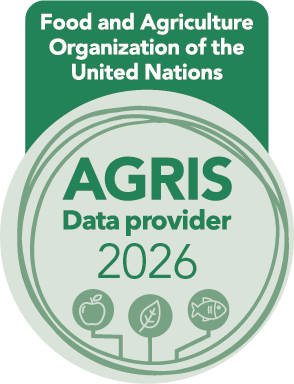Evaluation of the degrading potentials of plasmid and non–plasmid borne soil bacterial strains on bonny light crude oil
DOI:
https://doi.org/10.26832/24566632.2024.090103Keywords:
Bioremediation, Crude oil, Gas chromatography, n –Alkanes, Soil pollutionAbstract
This study was undertaken to evaluate the degrading potentials of plasmid and non–plasmid borne soil bacterial strains on Bonny light crude oil. Enrichment technique, turbidometric test, plasmid curing test as well as gas chromatographic flame ionization detection technique was adopted for isolating and evaluating the oil degrading capabilities of the selected bacterial strains. The preliminary physicochemical results revealed that pH was recorded slightly neutral, higher conductivity (0.41 to 0.44 μS/cm), higher organic carbon (2.32 to 4.34 %) but lower nitrogen and phosphorus contents (0.27 % and 10.11 kg) as well as lower water holding capacity was noted, respectively. The results indicated that 22 out of the 60 isolated bacterial strains had high crude oil degrading potentials (A600nm > 0.3). The result further indicated that bacterial strains belong to various species which are Bacillus cereus C12, Pseudomonas aeruginosa KAVK01, Bacillus licheniformis 126, Ochrobacterium intermedium E85b, Bacillus subtillis SDDlas, Bacillus subtillis LK4.5, Enterobacter cloacae GEBRI III and Bacillus cereus So24. Plasmid borne P. aeruginosa strain KAVK01 was the best degrader with 88 % remediation efficiency within the period while the plasmid cured P. aeruginosa strain KAVK01 had 65 % degradation with the order of n – alkane hydrocarbon degradation: (n-C8 - n-C17) > (n-C18 - n-C25) > (n-C26 - n-C32). The data obtained from the current study could help in the selection of bacterial species, most especially plasmid borne bacteria that can be employed in the restoration of oil contaminated soil ecosystem in the Niger Delta region of Nigeria.
Downloads
References
Abdel-Shafy, H. I., Mona, S. M., & Mansour (2016). A review on polycyclic aromatic hydrocarbons: Source, environmental impact, effect on human health and remediation. Egyptian Journal of Petroleum, 25 (1),107-123.
Ahda, Y., Azhar, M., Fitri, L., Afnida, A., Adha, G.S., Alifa, W.N., Handayani, D., Putri, D.N., Irdawati, I., & Chatri, M. (2018). Biodegradation capability of some bacteria isolates to use lubricant oil in vitro. IOP Conf. Series: Materials Science and Engineering, 335, 012134. https://doi.org/10.1088/1757-899X/335/1/012134
Ajao, A. T., Yakubu, S.E., Ameh, V. J., & Ameh, J. B. (2013). Bioremediation of refinery waste using immobilized Burkholderia cepacia and Corynebacterium sp. and their transconjugants. Journal of Xenobiotics, 3 (4), 19 – 23.
Association of Analytical Chemists (AOAC) (2012). Bioaccumulation, fungi and heavy metals. Journal of Advanced Microbiology, 7, 5 - 10.
Ayogu, C. V., Ifeanyi, V. O., & Obasi, N. P. (2020). Monitoring of metabolic compounds from degradation of petrochemicals using indigenous consortium of Pseudomonas strains. Nigerian Journal of Microbiology, 34(2), 5221-5238.
Bada, B. S., Egbeja, T. I., Arowolo, T. A., & Obuotor, T. M. (2019). Degradation of total petroleum hydrocarbon in petroleum products contaminated soil using pig dung. West African Journal of Applied Ecology, 27(2), 1-15.
Baig, Z. T., Abbasi, S. A., Memon, A. G., Naz, A., & Soomro, A. F. (2021). Assessment of degradation potential of Pseudomonas species in bioremediating soils contaminated with petroleum hydrocarbons. Journal of Chemical Technology and Biotechnology, 96, https://doi.org/10.1002/jctb.6820
Blanca, L., Eduardo, P., & Vanessa, V. (2016). Effects of exposure to oil spills on human health: updated review. Journal of Toxicology and Environmental Health, Part B, 19 (3-4),105 – 128.
Ebakota, O. D., Osarueme, J. O., Gift, O. N., Odoligie, I., & Joseph, O. O. (2017). Isolation and characterization of hydrocarbon-degrading bacteria in top and Subsoil of selected Mechanic Workshops in Benin City Metropolis, Nigeria. Journal of Applied Sciences and Environmental Management, 21 (4), 641-645.
Esmaeili, Y., Sasan, H., Zargarimarandi, A., & Hassanshahian, H. (2020). Study of plasmid profile and alkane hydroxylase genes in crude-oil degrading bacteria isolated from the Persian Gulf. Indian Journal of Geo Marine Sciences, 49 (04), 610-615.
Fagbemi, O. K., & Sanusi, A. I. (2017). Chromosomal and plasmid mediated degradation of crude oil by Bacillus coagulans, Citrobacter koseri and Serratia ficaria isolated from the soil. African Journal of Biotechnology, 16 (21), 1242-1253.
Gayathri, E., Bharathim, B., & Natarajan, S. (2014). Isolation, identification and characterization of diesel degrading bacteria. International Journal of Current Research, 6(6), 7295 – 300.
Hassanshahian, M., Mohammad, S. Z., & Farzaneh, H. M. (2014). Isolation and characterization of crude oil degrading bacteria from the Persian Gulf (Khorramshahr Provenance). Marine Pollution Bulletin, 82 (1), 39-44.
Ifelebuegu, A. O., Justina, E. U., Anita, U. A., Ernest, O. N., & Stephen, C. T. (2017). Environmental effects of crude oil spill on the physicochemical and hydrobiological characteristics of the Nun River, Niger Delta. Environmental Monitoring and Assessment, 189 (4), 173-179.
Isibor, P.O., & Imoobe, T.O.T. (2017). Comparative analysis of contaminability between Clarias gariepinus and Tilapia mariae. Annual Research and Review in Biology, 16 (5), 1-14.
Isiodu, G. G., Stanley, H. O., Ezebuiro, V., & Okerentugba, P. O. (2016). Role of plasmid-borne genes in the biodegradation of polycyclic aromatic hydrocarbons (PAHS) by consortium of aerobic heterotrophic bacteria. Journal of Petroleum and Environmental Biotechnology, 7, 264.
Macaulay, B.M. & Rees, D. (2014). Bioremediation of oil spills: a review of challenges for research advancement. Annals of Environmental Science, 8, 9-37.
Malik, Z. A., & Ahmed, S. (2012). Degradation of petroleum hydrocarbons by oil field isolated bacterial consortium. African Journal of Biotechnology, 11, 650 – 658.
Nakamura, F.M., Germano, M. G., & Tsai, S.M. (2014). Capacity of aromatic compound degradation by bacteria from Amazon Dark Earth. Diversity, 6, 339 – 353.
Ndubuisi-Nnaji, U.U., Uduak, I.G., Okpokwasili, G.C., & Nwaokorie, F.O. (2014). Plasmid profile of bacterial isolates from fertilizer amended tropical agro soil. Environmental Microbiology, 6 (1), 16-21.
Nkanang, A., Antai, S. P., & Asitok, A. D. (2017). Bonny light crude oil degradative potental of species of Citrobacter sp. Microbiology Research Journal International, 21(4), 1-10.
Nwanyanwu, C. E., Opurum, C. C. and Nweke, C. O. (2016). Crude oil biodegradation potential of bacterial strains isolated from mangrove ecosystem. FUTO Journal Series, 2(1), 244-254.
Nwinyi, O. C., & Olawore, Y. A. (2017). Biostimulation of spent engine oil contaminated soil using Ananas comosus and Solanum tuberosum peels. Environmental Technology & Innovation, 8,373-388.
Obafemi, Y.D., Isibor, P. O., Adeyemi A. O., & Taiwo O. S. (2018). Plasmid profiling of crude petroleum degrading bacterial strains isolated from polluted soils in Ota, Nigeria. Annual Research and Review in Biology, 25 (5), 1-11.
Okore, C. C., Ogbulie, T. E., Odangowei, O. I., Ejiogu, C., Duruojinkeya, P., Ogbukaa, I. B., & Ajoku, J. U. (2021). Plasmid profiles of bacterial isolates from kerosene, diesel and crude oil polluted soils. Global Scientific Journal, 9 (7), 1994-2005.
Olukunle, O. F. (2019). Phylogenetic analysis of hydrocarbon degrading bacteria associated with crude oil polluted soil from Mesogar Community, Delta State, Nigeria. Nigerian Journal of Biotechnology, 36(2), 62 – 76, https://dx.doi.org/10.4314/njb.v36i2.8 62
Osarumwense, J.O., Igiebor, F.A., & Idahosa, D.E. (2019). Isolation, characterization and identification of bacterial isolates from auto-mechanic workshop contaminated with hydrocarbon. The Pacific Journal of Science and Technology, 20 (1), 349 – 355.
Saha, I., Datta, S., Biswas, D., & Sengupta, D. (2022). A comparative study on chemical characterization and properties of surface active compounds from Gram-positive Bacillus and Gram-negative Ochrobactrum strains utilizing pure hydrocarbons and waste mineral lubricating oils. World Journal of Microbiology and Biotechnology, 38, 141. https://doi.org/10.1007/s11274-022-03321-5
Santisi, S., Simone, C., Maurizio, C., Giuseppe, M., Mehdi, H., Lucrezia, G., Laura, G., & Michail, M. Y. (2015). Biodegradation of crude oil by individual bacterial strains and a mixed bacterial consortium. Brazilian Journal of Microbiology, 46(2), 377 – 387.
Uba, B. O. (2018). Growth profile and catabolic pathways involved in degradation of aromatic hydrocarbons by marine bacteria isolated from Niger Delta. Microbiology Research Journal International, 26 (5), 1-18.
Uba, B. O., Chukwura, E. I., Okoye, E. L., Ubani, O., Irabor, M. I., Onyekwuluje, N. V., Ajeh, J. E., Muogbo, C. S., Nwafor, M. C., Igboesorom, C. C., Nwodo, C. J., Okafor, J. C., & Nwachukwu, C. J. (2018). Multiple degradation and resistant capabilities of marine bacteria isolated from Niger Delta, Nigeria on petroleum pollutants and heavy metals. Journal of Advances in Biology and Biotechnology, 20 (1), 1 – 17.
Uba, B. O. (2019a). Aromatic hydrocarbons degradation and plasmid profile of marine bacterial isolates obtained from petroleum contaminated marine environments of Niger Delta, Nigeria. Microbiology Research Journal International, 27 (1), 1-20.
Uba, B. O. (2019b). Phylogenetic framework and metabolic genes expression analysis of bacteria isolated from contaminated marine environments of Niger Delta. Annual Research & Review in Biology, 30 (5), 1 – 16.
Ughala, E., Ogugbue, C. J., & Okpokwasili, G. C. (2019). Enhanced remediation of a long term crude oil polluted soil using soya bean and poultry residues. International Research Journal of Public and Environmental Health, 6 (8), 210-218.

Downloads
Published
How to Cite
Issue
Section
License
Copyright (c) 2024 Agriculture and Environmental Science Academy

This work is licensed under a Creative Commons Attribution-NonCommercial 4.0 International License.




